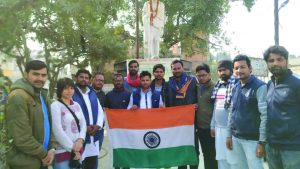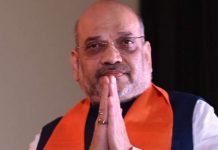 Blatant use of police force on non-violent peaceful protesters has become order of the day in the state of Uttar Pradesh. Muzzling dissent against political discourse by bureaucratic machinery is against all norms of participatory democracy. The Yogi Adityanath government is allegedly using draconian laws to silence unarmed peaceful protesters opposing Citizenship Amendment Act (CAA) and National Register of Citizenship (NRC) by invoking preventive detention laws, which used to be applied by British rulers on freedom fighters and martyrs. Even the courts have
Blatant use of police force on non-violent peaceful protesters has become order of the day in the state of Uttar Pradesh. Muzzling dissent against political discourse by bureaucratic machinery is against all norms of participatory democracy. The Yogi Adityanath government is allegedly using draconian laws to silence unarmed peaceful protesters opposing Citizenship Amendment Act (CAA) and National Register of Citizenship (NRC) by invoking preventive detention laws, which used to be applied by British rulers on freedom fighters and martyrs. Even the courts have
consistently upheld the right to dissent of people against the Act made by the Government and the bureaucracy needs to be sensitive when it exercises powers given by law.
At a time when Bombay High Court allowed a petition quashing the prohibitory orders banning protest against CAA and NRC the Yogi government came heavily and arrested a group of 10 students from Banaras Hindu University and Allahabad University for originated a foot march ‘Padyatra’ with an aim to propagate Gandhian philosophy of peace, amity, communal harmony and non-violence. The foot march from the Chauri-Chaura to Rajghat planned to revive Gandhian legacy to strengthen sprit of non-violence and democratic right to hold peaceful protest against any law.
The Padyatra continued peacefully for about 250km through Azamgarh and Mau but stopped in Ghazipur by SDM Sadar. Local police ironically detained all of them for allegedly for breaking prohibitory orders imposed in the town under Section 144 of Cr.PC, charges that they have denied. The 10 young ‘Satyagrahis’ students were marching for peace, amity and communal harmony when they were arrested on February 11, allegedly for ‘walking in a group without permission.’ The Sub Divisional Magistrate allowed their bail application the next day but imposed stringent arbitrary conditions, practically unmanageable for the students. These student activists who were also opposing the CAA, NPR and NRC demanded their immediate and unconditional release and refused to frighten down by the administration.
SDM (Sadar) Ghazipur then passed a bizarre bail order against 10 people in jail including a female journalist and social activist. On 9th day of this foot march the police detained them in Ghazipur UP under Section 107/116, 151 on February 11, 2020, and sent them to jail. Considering the bail applications moved by arrested protesters, the SDM allowed their bail subject to furnishing of two bail bond of 2.5 lakh each and surety of two Gazetted officer for every person. These protesters include a freelance journalist Pradipika Saraswat who had lodged in female barrack of the jail. Other activists who are in jail include Priyesh Pandey, Manish Sharma, Murari Kumar, Atul Yadav, Ravindra Kumar Ravi, Shesh Narain Ojha, Anant Shukla, Neeraj Rai and Raj Abhishek.
“Why will a government officer take someone’s bail when he works under the same government? This is further an attempt to crushdemocratic rights free speech and expression and movement of citizens. The order of the SDM is against principles of natural justice,” alleged protesters in letter addressed to nation.
“In UP govt has used Section 144 to suppress all voices of dissent, government has imposed Section-144 in all districts for next three months. They even have problem with people who are spreading Gandhian thought of mutual brotherhood and tranquility and telling to stay away from Hindu-Muslim fight,” they added.
In a written notice to Jail Superintendent these students mentioned, “We Nagrik Satyagrahis have started Hunger strike from February 13, 2020, 05pm inside Ghazipur jail for restoration of our human rights till we are set free. India is our country and police will not decide where we can go peacefully.”
“We were on a peaceful foot march from Chauri-Chaura to Rajghat Delhi. UP Police has repressed our basic human rights by arresting us without any ground,” the letter revealed.
“The police have tried to belittle the objective of our Padyatra, In FIR, they said our Padyatra is against CAA and NRC. It is just an attempt of police and administration to divert the whole motive of this journey. The Padyatra is against every form of violence and hate that exists in the society and aims to spread the Gandhian ideas of peace and nonviolence. We were telling youth to stick with issues of education, health and jobs and don’t let politicians fill you with hate against any religion or caste,” they claimed.
Government is using its police to arrest peaceful people who are on a foot march. “We want to state that we are children of Gandhi’s India and Satyagrah is our weapon to fight your hate. We will speak outside the jail and even inside the jail.”
The eastern Uttar Pradesh had been a center of freedom movement where Balia remained free of British rule and Indian flag remained hoisted for 14 days in 1942. Police action on the Padyatris sparked huge protests across party lines where citizens staged aggressive demonstrations for unconditional release of student protesters who were carrying a peaceful march propagating massage of peace and harmony. It resulted in clashes and heated exchanges with police and administration. Several citizens courted protest arrests who were later released in the evening.
Meanwhile, human rights group have filed a writ petition through advocates Kamal Krishna Roy and Charley Prakash in the Allahabad High Court challenging the legality of the arrests of these students for violation of their right to life and liberty under Article 21 of the Constitution of India. The conduct ofeducating the masses about path of humanitarian values of peace, communal harmony and nonviolence shown by Mahatma Gandhi for achieving freedom, liberties and independence cannot be held to be violative of any law. The matter will be mentioned for urgent hearing.
In view of adverse public reactions, the government may back-track its decision and could set free these peace protesters unconditionally by just signing a personal bond.
The historic Chauri-Chaura, a village under Gorakhpur district in eastern Uttar Pradesh, came to prominence during the struggle for Indian independence after a violent incident between the British Indian police and political activists. On February 4, 1922, supporters of the Khilafat movement and the Indian National Congress clashed with local police. An angry mob set ablaze the local police station, killing 22 policemen who took shelter inside. The incident dealt a blow to the non-violent non-cooperation movement led by Mahatma Gandhi, who denounced the violence in Chauri-Chaura and called off a campaign of civil disobedience.
letters@tehelka.com












